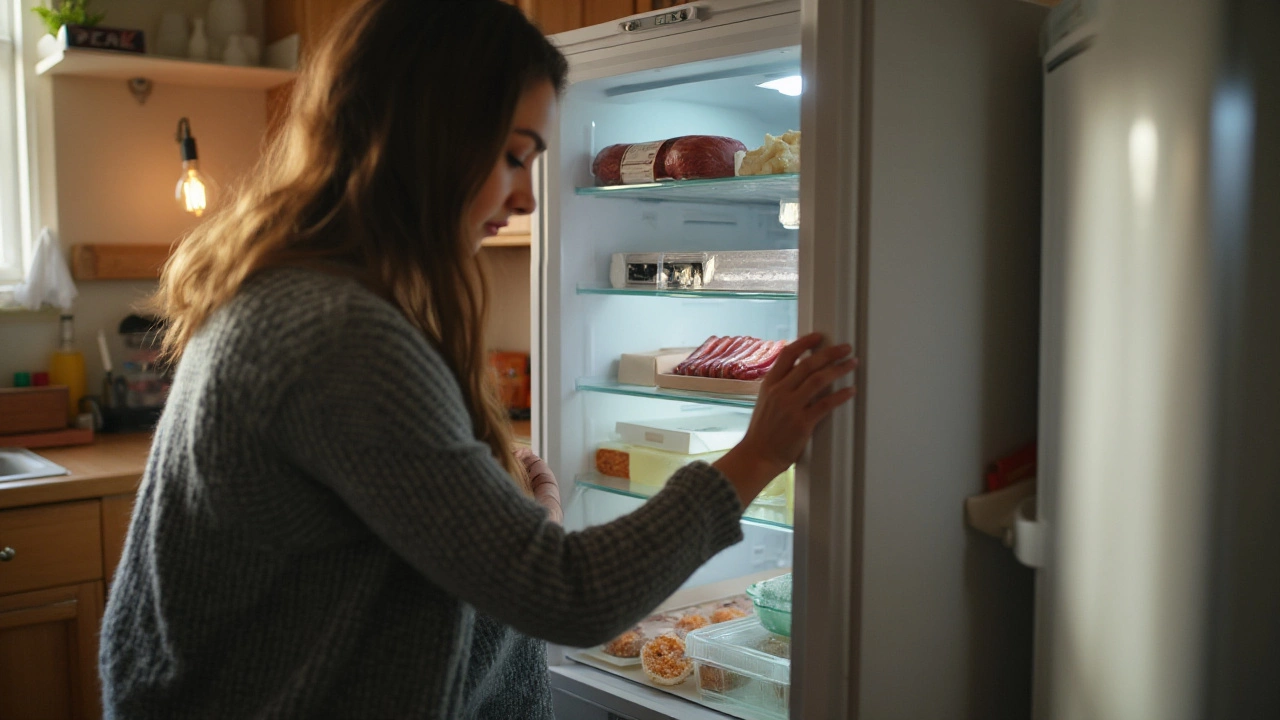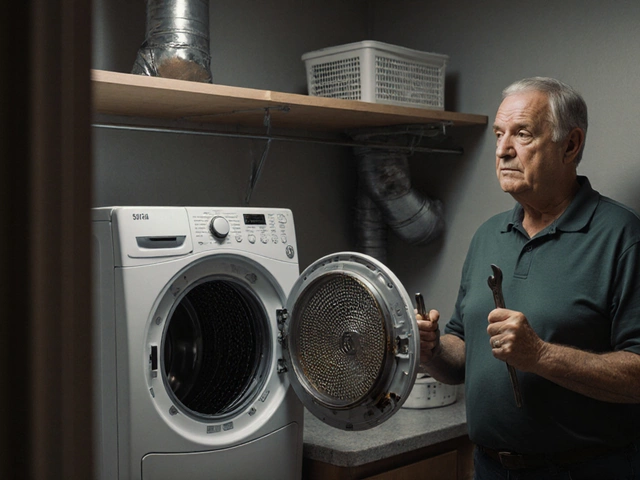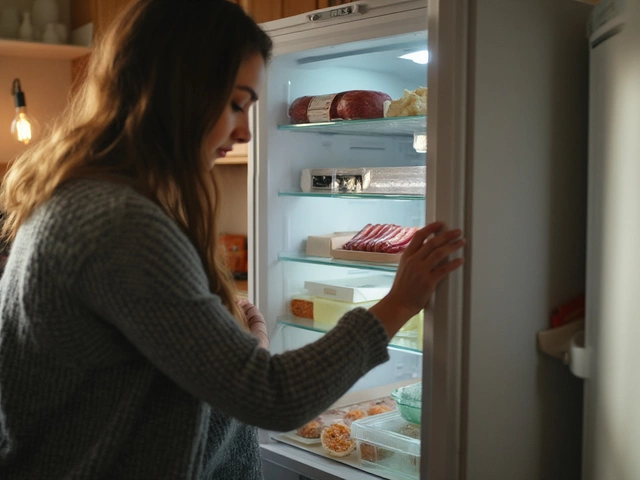Your freezer quietly hums along in your kitchen, a tireless worker ensuring your food stays fresh and ready for your culinary experiments. But what happens when it stops doing its job? Knowing whether your freezer is broken isn't always straightforward, but recognizing the early warning signs can prevent a calamity in your kitchen.
From the unmistakable pools of water seeping from beneath the appliance to the less obvious cues like excessive frost buildup, learning to decode what your freezer is trying to tell you can save both time and money. Stay with us as we go through the telltale signs of a faulty freezer, identify possible causes, and explore practical DIY methods before you decide it's time for a professional’s intervention.
- Identifying the Signs
- Common Causes of Freezer Malfunctions
- DIY Troubleshooting Tips
- When to Call a Professional
Identifying the Signs
When it comes to determining if your trusty cold storage appliance is on the brink, sometimes it speaks in whispers rather than screams. Freezers, much like older cars, often give you hints that something might be amiss before they completely quit. It starts with the subtle stuff, like the sound. Is it humming more loudly than usual, or perhaps the hums are joined by intermittent clunks? These noises often indicate the freezer is working overtime due to a possible mechanical problem, like struggling compressor or a failing motor. Listen closely, since your freezer may indeed tell you what’s going wrong if you’re attentive enough.
Another classic sign is when your food doesn’t look quite right—either too frozen or not frozen at all. If the ice cream's consistency resembles soup or the chicken won't budge from its frosty embrace, these are not just signs of annoyance, they’re signs of a broken or failing freezer. Such inconsistency in temperature might mean a faulty thermostat or even freon leak, both of which need attention quickly before food spoilage sets in. A skilled DIY enthusiast might attempt some basic fixes, but complicated thermal regulation issues are best left to experts, as counterintuitive troubleshooting can worsen the problem.
Water where it shouldn’t be is also a red flag. Puddles underneath or around your freezer can be quite telling. This can indicate a broken seal, or worse yet, the defrost drain might be blocked or frozen. Such a problem, if ignored, leads not only to a failing freezer but also to potential flooring damage. Usually, you’ll need to unplug the freezer, locate the drain, and attempt to clear any blockages—a task that might require some patience and a little bit of elbow grease. If you’re comfortable with a screwdriver and a flashlight, you might decide to tackle this on your own, but keep an eye on the problem over time to ensure your solution sticks.
Sometimes the most obvious clues are the simplest. Have you noticed an eerie lack of chill in the air where it once was always crisp? An absence of the familiar cold burst when you open the door usually spells trouble. Freezer repair often starts with checking the power supply, but if the freezer is receiving power and yet fails to maintain the chill, then deeper mechanical issues may be at play. Don't rule out doing a quick circuit breaker check or ensuring the plug connection is tight—simple fixes like these can occasionally solve what seems like a significant problem.
"In many cases, the first signs of a freezer issue appear subtly," says appliance expert Jeanine Mills. "Owners who catch on early often save the most time and money on repairs."
If you're living through these problems, it could help to peek at a personal log of past maintenance. Note when and if parts have been replaced before, like thermostats or door seals, which can wear out over time. If parts have been recently changed but the problem persists, you might be looking at more serious issues like a malfunctioning evaporator fan, especially if frost builds up overnight. Consulting a professional might be wise here, since improperly handled electrical components can be quite dangerous. Remember, always approach electrical repairs mindfully, or consult someone who is trained to deal with these urgent matters safely.
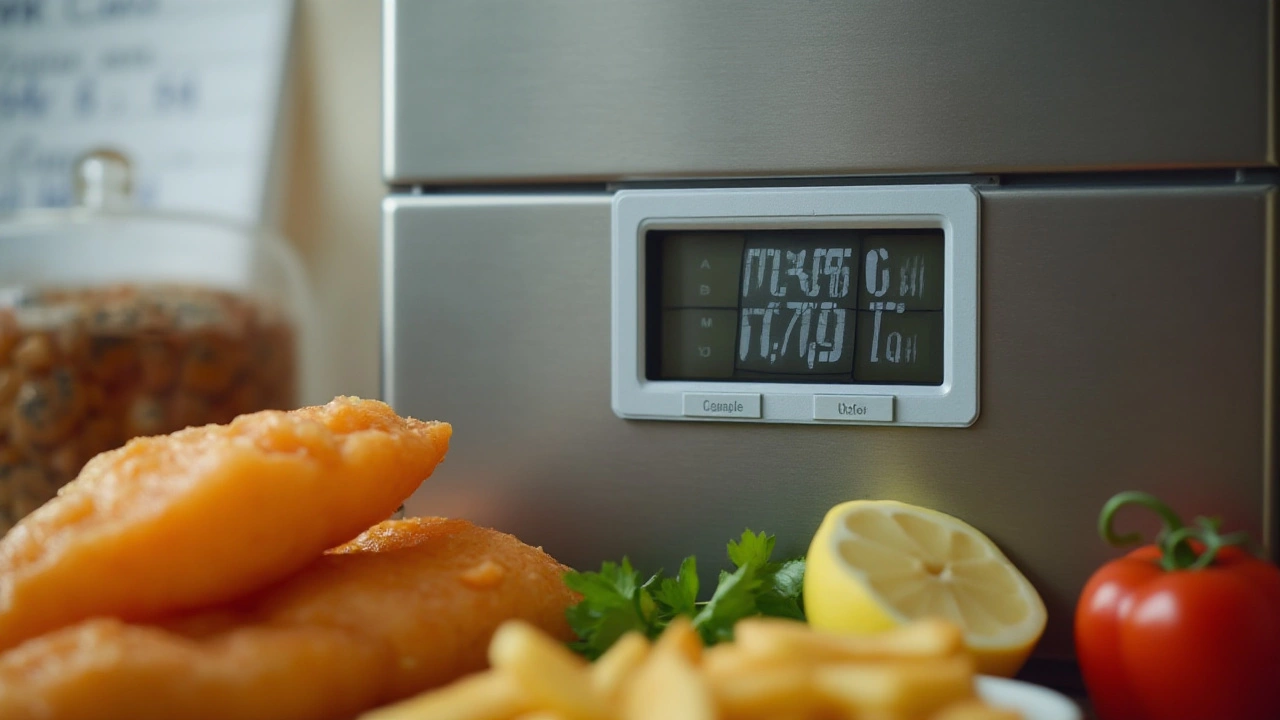
Common Causes of Freezer Malfunctions
Freezers are the silent superheroes of our kitchens, continually at work to keep our food preserved and fresh. But just like any appliance, they aren't immune to wear and tear or unexpected issues. Understanding the sources of these problems can be the key to a quick and effective fix, and it might surprise you how often these troublemakers go unnoticed. One frequent villain is the buildup of frost, which can indicate a problem with the defrost system. When frost clogs the air vents inside your freezer, it results in poor airflow, making your freezer's motor work overtime to maintain the correct temperature. Sometimes, the defrost heater, timer, or thermostat fails, making it impossible for your freezer to regulate frost buildup. It's like trying to sip a milkshake through a straw that's been frozen shut—pretty impossible, right?
Another common cause you might not consider is the gasket seal around the door. If it's compromised or damaged, it can let warm air seep in, throwing off the internal temperatures and leading to frost problems or melting with watery consequences. An old or faulty compressor is another likely suspect. When the compressor weakens, the freezer might struggle to maintain the low temperatures necessary, leading to spoiled goods. Compressors can lead hard lives, starting and stopping repeatedly as they try to manage the freezer's demands, potentially cutting their own lifespans short. According to a recent survey by Appliance Community, over 20% of reported freezer issues stem from compressor faults alone.
Your freezer's internal thermometer might also sway your appliance from frosty efficiency to malfunctioning mess. If the thermostat isn't accurately interpreting the temperature, it can't signal the compressor to kick in as needed. This often results in food that's alternately rock-solid or soft—never a good surprise when you open the door hoping for a midday treat. Problems with the evaporator fan or the condenser coils are sneaky suspects that can add unwanted drama to your freezer's operations. Evaporator fans circulate the cold air throughout, so if they fail, the temperature across the freezer might vary wildly. Likewise, when condenser coils are dirty or blocked, they prevent the system from dispersing heat properly, impacting freezing efficiency.
"In our investigations, nearly 30 percent of freezer issues come down to poor maintenance and cleaning," notes John Martin, a technician with Safe Appliance Services. "Dusty coils or blocked vents are easy to resolve yet easily ignored, often leading to bigger troubles in the long run."
Unusual noises might also indicate something's off. Freezers should hum along quietly, so if yours is rattling, buzzing, or clunking like a tiny movie set for sound effects, it could be crying out for attention. Finally, sometimes electricity supply issues can simulate freezer failures. A power surge or electrical component failure might drop the freezer's performance, creating symptoms without the appliance itself being structurally compromised.
Understanding these common culprits can better equip you to troubleshoot and, ultimately, save you from finding an unwanted swimming pool on your kitchen floor from a melted freezer debacle. Knowing these usual suspects, you now can confidently tackle the mishaps and keep your freezer in peak condition, ready to protect both your food and your peace of mind.
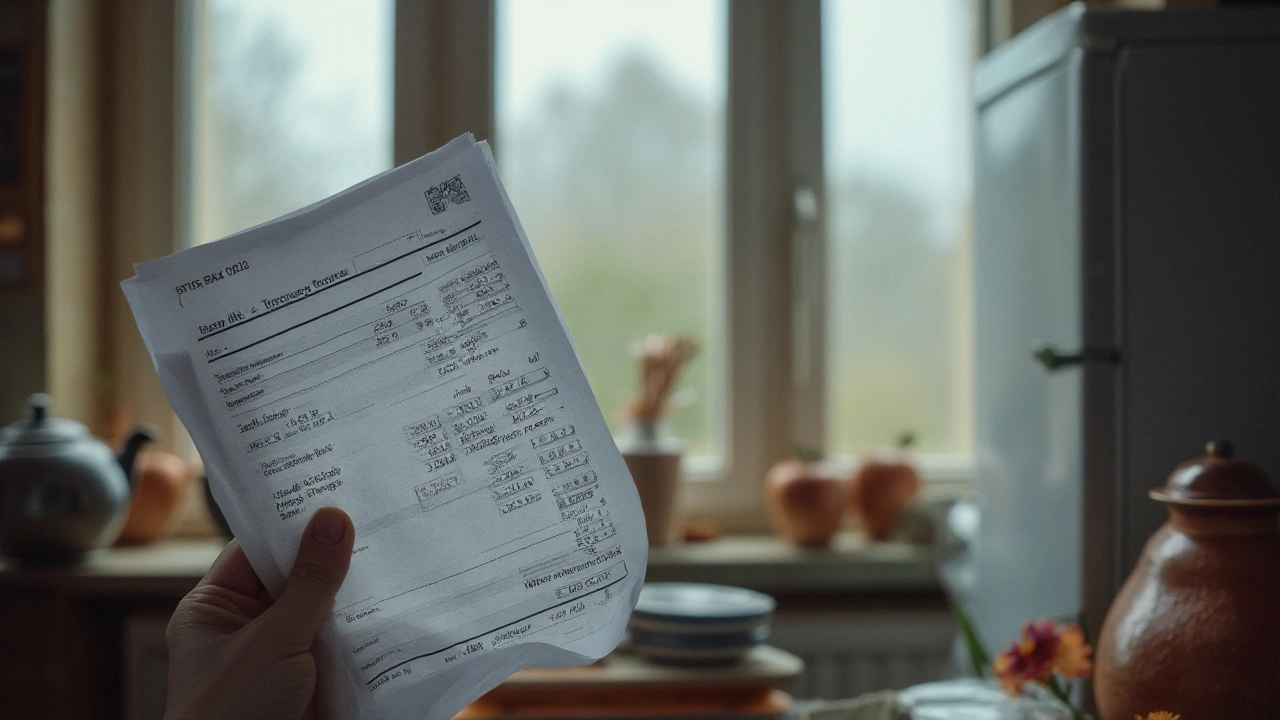
DIY Troubleshooting Tips
Your trusty freezer might throw a curveball now and then, but before panic sets in, there are several do-it-yourself solutions you can try. It's astounding how often the simplest fixes can revive an appliance from the brink. The first step in this journey is to comfortably locate yourself within your freezer's manual, for it holds a treasure trove of insights specific to your model. But if that’s misplaced, let's dive into some universal tips.
Begin by checking if your appliance is well-powered. Sometimes a loose plug or a flipped breaker can be the culprit behind a seemingly more sinister issue. Ensure the freezer's power cord is securely plugged into the outlet, and verify the outlet's functionality by plugging in a different device. If something is off with the power, that’s your starting point. And if it’s not, move ahead by examining the temperature settings. Freezers are designed to operate within specific temperature ranges, typically around zero degrees Fahrenheit. Adjust the thermostat and monitor if it prompts a reaction. Often, temperatures may have been accidentally altered without realizing.
Now, let's talk about common blockages and airflow. Freezers rely on air circulation to maintain an even chill, and issues can arise when this flow is restricted. If your freezer is packed to the brim, consider rearranging or removing items to allow air to move freely. At times, the evaporator fan might be blocked by ice or debris, hindering airflow. Defrost manually and ensure nothing obstructs the fan's path, be it ice or food packaging.
"Ignoring airflow often leads to temperature inconsistencies," says Jane Dowson, an appliance technician with two decades of experience. "Often, people overlook how packing their freezer without thought can cause uneven cooling."
Next up is the door seal, an often overlooked hero in your freezer's battle against heat. A damaged or worn seal can sabotage your freezer's efficiency, letting warm air infiltrate and wreak havoc on its internal climate. Perform the dollar bill test—insert a bill into the door's closing edge and pull it out. If it slips out easily, your seal might need replacing. Robust seals ensure that your efforts in maintaining optimum temperature aren't in vain.
Finally, give attention to the coils. These components, often hidden at the appliance's back, play a significant role in cooling efficiency. Coils caked with dust and grime can cause the compressor to overwork, leading to potential breakdowns. A vacuum or coil brush can clear accumulated debris, so make it routine maintenance for your freezer.
While these tips might seem simple, they account for numerous issues experienced by many. But remember, if symptoms persist after your investigation and remedy attempts, reaching out to a professional is the best course of action. Not only will you avoid escalating the problem, but you'll also gain peace of mind knowing a specialist has looked over your appliance. Sometimes, a little professional insight is precisely what's needed to get your freezer back in top shape.

When to Call a Professional
There comes a point when even the most enthusiastic DIY enthusiast has to admit defeat, and that’s okay. Sometimes the only way to ensure your freezer repair goes smoothly is to bring in an expert. Knowing when to make that call can save you from unnecessary headaches and potential risks. For instance, if there’s a complete lack of power to your appliance despite it being properly plugged in, it's time to pick up the phone. This could denote electrical issues, which can be dangerous and require professional attention. A technician has the tools and expertise to safely diagnose and repair electrical components.
Another scenario that warrants professional intervention is when you detect unusual noises that you've never heard before. A persistent buzzing, grinding, or screeching could indicate severe mechanical problems. These noises often suggest a motor complication or compressor fault, neither of which should be tamed by amateur hands. Not only can untrained attempts lead to further damage, but they might also void your appliance warranty.
If you notice that the temperature inside the freezer isn’t steady, fluctuating significantly, it's another cue for expert help. A proficient technician can properly assess the situation, checking thermostat functionality and the coolant system to ensure everything works as it should. Temperature issues might seem minor at first, but they lead to food spoilage and energy inefficiency, hitting your wallet twice over.
Water leaks, persistent ice buildup, and frost accumulation are also red flags that necessitate professional service. A leaking freezer might have a blocked defrost drain or could indicate drain pan problems. Such issues, if not addressed properly, can cause further damage to your kitchen floor or other surrounding structures. Professionals possess the skills to safely dismantle and fix these components without causing any further damage.
According to the American Home Shield, "a professional appliance repair service can provide a warranty of up to 12 months on their repairs, giving homeowners peace of mind and assurance that the problem is resolved."
Don't shy away from calling in the experts when faced with intricate problems. Your safety and the longevity of your appliance are worth the investment. Weighing the cost of a repair call against potentially irreversible damage to your freezer means being wise about when to delegate the responsibility. It's always better to err on the side of caution for the sake of your home and household.
Taking proactive steps to maintain the well-being of your appliances keeps your kitchen humming along happily. Regularly servicing and checking your freezer ensures a longer lifespan, much like a professional service for your car. It’s the same level of commitment and care that will help prevent those unwelcome malfunctions in the future.

